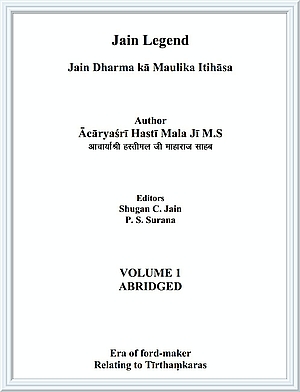Lord Śrī Vāsupūjya was the 12thTīrthaṃkara after Śreyāṃsanātha. In his previous incarnation he was king Padmottara of the Maṃgalāvatī Vijaya on the island of Puṣkarārdha. As Padmottara he constantly devoted himself to the Jina's teachings. He always knew in his mind that wealth is finite and deeds of merit destructible. Hence the true well-being rests in attaining salvation alone. By coincidence he met guru Vajranābha. Becoming is interested after hearing hi instructions, king Padmottara took initiation and contemplating and practicing instruments (sthānakas) through intense, difficult austerities, obtained the Tīrthaṃkara nāmakarma. At the end of his life, in deep meditation, he became a powerful god in the Prāṇata heaven.
India's famous city of Campā had for its king Vasupūjya, and his queen was Jayādevī. The soul of Padmottara, after its time in Prāṇata heaven, entered the womb of queen Jayādevī on the 9th day of the bright half of the Jyeṣṭha month under constellation Śatabhiṣā. The queen saw the 14 auspicious reams and after completing her pregnancy period, gave birth to a son on the 14th day of the dark half of Fālguna under constellation Śatabhiṣā. Since he was the son of king Vāsupūjya, he was named Vāsupūjya.
According to Ācārya Hemacandra, Vāsupūjya was considered unmarried / a celibate since birth. Jinasena and the Digambara tradition too, have the same view. According to Hemcandra when prince Vāsupūjya became eligible for marriage the king Vasupūjya expressed his desire that you, too, should, like the previous Tīrthaṃkara, follow the former tradition of marriage, kingship, initiation and mendicancy. Responding to his father Vāsupūjya told him those people had certain bhoga-karmas (karmas of enjoyment of worldly pleasures) left while I do not have any. In future, too, Mallinātha, Neminātha, etc. will take initiation unmarried; hence you may grant me permission to take the spiritual path of self-restraint. According to Hemcandra his parents agreed with him and he took initiation without enjoying married life or kingship. However, Ācārya Sīlāṃka mentions his having married and ruled for some time before taking initiation. In fact, the activities of Tīrthaṃkara as householder happens in accordance with their bhoga-karmas, hence his being married or not does not have any special meaning here. Marriage is not an obstruction to Tīrthaṃkara -hood of a Tīrthaṃkara.
Completing 18 lakh years, on the lokāntika gods' prayers, Vāsupūjya gave charities for a year and thereafter with 600 other kings, took initiation with a one-day fast (called caturthabhakta) and on the dark half of the moon being in conjunction in the Fālguna month, under the constellation Śatabhiṣā, renouncing all bad deeds, became a Śramaṇa. On the second day, at the home of king Sunanda he broke his first fast with rice pudding. The gods showered the five auspicious things to express the greatness of the giving/ charity (dāna).
After taking initiation the Lord wandered as a mendicant for a month and in that same garden under the Pāṭalā tree became meditative. In the second stage of deep meditation, destroying the four ghātikarmas, on the second day of the bright half of Māgha month under the constellation Śatabhiṣā, he obtained pure knowledge after a day's fast. As a kevalī the Lord gave a sermon to the gods, demigods and men in a grand assembly, and explaining the ten-fold dharma including kṣānti etc., founded the four-fold creed and became Tīrthaṃkara of the period. While wandering when Lord Vāsupūjya arrived at Dwārikā, the second Vasudeva of the time, Dvipṛṣṭa, hearing the news of his arrival, presented himself there and accepted the path of self-restraint hearing the detached speech. Baladeva Vijaya also accepted the spiritual path and in time became a monk and attained liberation.
This way, like Lord Śreyāṃsanātha, Lord Vāsupūjya also had a vast influence over the royalty of that time. One month less of 54 lakh years he wandered as a kevalī, preaching lakhs of people and in the end at Campā city, along with 600 monks, he observed a month-long fast and in the fourth stage of deep meditation, stopped all activities, breaking all karmas and attained enlightenment and nirvāṇa on the 14th day of the bright half of Āṣāḍha under the constellation Uttarābhādrapada.
His congregation had 66 gaṇas and Gaṇadharas, 6000 omniscient, 6100 telepaths,5400 clairvoyants, 1200 14-pūrvadhārīs, 10000 vaikriyalabdhidhārīs, 4700 vādīs, 72000 monks, 100000 female-monks, 215000 votaries (śrāvakas) and 436000 female-votaries.
 Acharya Hasti Mala
Acharya Hasti Mala
